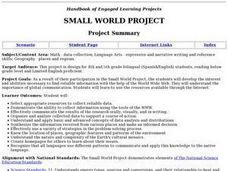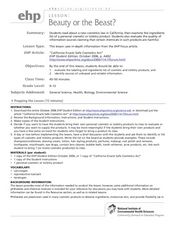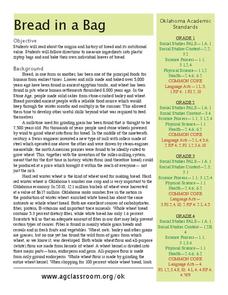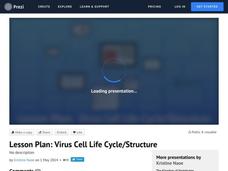Curated OER
Language Arts: Gathering the Appropriate Information
Students are able to use the library and/or computer lab to research reliable information sources supporting arguments being put forward in the position paper. They are able to find examples of mission statements from various...
Curated OER
Fact or Fiction? Urban Legends and Misconceptions
Students are introduced to a process for using web site resources to verify the accuracy of biology information. They follow a guided instructional activity on evaluating web sites and determining content accuracy. They select a piece of...
Curated OER
Sociological Research Skills
In this Sociological Research Skills worksheet, students must write about the strengths, weaknesses, reliability, and limitations of various methods of research.
Curated OER
Worksheet for Analysis of a Written Document
In this primary source analysis worksheet, students respond to 16 short answer questions that require them to analyze the provided historical document.
Curated OER
Finding Verbs
In this grammar activity, students review how to recognize verbs in sentences and then find and circle the verbs in twenty sentences.
iCivics
NewsFeed Defenders Extension Pack
Accuracy, transparency, trustworthiness, and impartiality are four unspoken rules of journalism. Scholars delve deep into the subject by discussing the pros and cons of relying on social media for news. They also play an online game to...
Newseum
Evidence: Do the Facts Hold Up?
Sometimes it's hard to escape bad information! Pupils learn the E.S.C.A.P.E. method for evaluating news sources and complete a worksheet to assess a news article using their new skills.
Newseum
E.S.C.A.P.E. Junk News
Fair, balanced, and reputable information? There's an acronym for that! Scholars learn the E.S.C.A.P.E. method for evaluating news sources. Then, pupils work in small groups to read and analyze a news story and discuss the activity to...
Curated OER
Assessing Research Materials
Teaching learners how to evaluate a research source is an important part of the research process. The fresh idea here is that groups first develop a list of reasons why resources should be evaluated, transform these reasons into...
National Park Service
Nutcracker Fantasy
The Clark's nutcracker bird hides seeds in 25,000 different sites every year to save for winter. Lesson demonstrates how difficult it would be to find these seeds months later when they need them for food. In the first of five lesson,...
Curated OER
Small World Project
Young scholars participate in the Small World Project that develops their interest and abilities necessary to find reliable information from the Internet and through global communication. They develop homepages, research topics, and...
Curated OER
Locating Information Quickly in a Variety of Resources
Here is a lesson which may be best suited for a library science teacher, or one that can be done by a regular teacher when in the library. In it, learners explore the best ways to use print and electronic resources to find information...
Curated OER
Information Overload: Looking at News
How do events reported in mainstream newspapers, on television news, blog posts, and social network sites differ? Ask your class to investigate the way the same news item is presented in the many information sources available. Groups...
Curated OER
Parents And Alcohol: Who's To Blame
Students explore the topic of underage drinking. They find a focus and write a news feature/analysis that reports on what the community is doing to prevent underage drinking and some assessment of the extent of the problem.
Curated OER
Savvy Surfers: Website Evaluation and Media Literacy
Sixth graders strengthen their understanding of what a high quality website is composed of. Learners evaluate three websites for accuracy, credibility, and reliability by completing a chart.
PBS
How to Teach Your Students about Fake News
What media literacy skills do people need to evaluate a news source? Scholars listen to and discuss an NPR story about how fake headlines often dupe young people and adults alike. Next, they study news stories, using a fact-checking...
Curated OER
Beauty or the Beast
Does the FDA really intend to protect public health? Spark a debate in your chemistry or health class by using this article, titled "Beauty or the Beast." It questions the safety of cosmetics and toiletry products, govenment regulations,...
Curated OER
Encouraging Answers
What is the celebration of Columbus Day really about? Older learners use inquiry-based methods to find out who Columbus really was and what motivated his journeys. They take on the roles of town officials who must consider whether or not...
Curated OER
Bread in a Bag
Could the history of bread really be interesting? Yes, it could! An informational text gives scholars wheat production background from 8,000 years ago, discussing different types of bread and the current industry in Oklahoma. Learners...
Curated OER
Political Campaign Ads
During a political campaign, you can hardly turn around without encountering an endorsement or attack on a candidate. High schoolers examine the ways that negative advertisement, positive advertisements, and everything in between can...
Prezi
Virus Cell Life Cycle/Structure
Viruses were nano before it was cool to be nano. The presentation covers the structure of a virus cell and the life cycle of a virus. It also includes two videos illustrating the virus cell in greater detail.
Curated OER
Evaluating Your Sources
Students practice making critical judgments about the sources sited when researching a topic on the internet and in real-life situations. They assess how sources vary in reliability and accuracy while reviewing a variety of source...
Curated OER
Quilt Codes
Young scholars list criteria to evaluate credible historical sources and defend their criteria in an essay. In this historical sources lesson plan, students review information of historical sources as well as the facts and pictures.
Curated OER
Finding and Gathering The News
Eighth graders discover what makes an event newsworthy. They research topics by using the five W questions. They examine the difference between facts and opinions and practice interviewing people for stories.

























